Anticipatory Grief
Much of life is spent anticipating both happy and sad events that are about to happen. This is true when we learn that someone we love does not have long to live. It is at this point that we begin to grieve the loss of our loved one, even while he or she is still alive. This experience is known as anticipatory grief.
It is important to know that both the person who is dying and those who will be left are grieving during this time. Anticipating the loss and knowing what is coming can be emotionally difficult for family and friends. It is not unusual to experience guilt for “wishing it were over,” or for seeing their loved one as already “gone.”
It is important to recognize that these feelings are normal. Other aspects of anticipatory grief that may be experienced by family and friends include but are not limited to:
- Anxiety
- Depression
- Heighted concern for the dying person
- Rehearsal of the death
- Attempts to adjust to the consequences of the death.
Anticipatory grief provides family/friends with time to gradually absorb the reality of
the coming loss. Family and friends are able to complete “unfinished business” with the dying person. For example, they may say “Good‐bye”, “I love you,” or “I forgive you.” Anticipatory grief allows you to prepare emotionally. Family and friends can address unresolved issues or seek out emotional and spiritual support. This may also be a time to discuss your loved one’s hopes for the family. It can also be a time to find out your loved one’s wishes regarding funeral arrangements.
Dealing with the various feelings one experiences when a loved one is dying can be overwhelming and difficult emotionally. If you want to talk to someone, please call Supportive Care, London Regional Cancer Program at 519‐685‐8622 and ask to speak to a Social Worker or the Spiritual Care Specialist
More Information
For information regarding in‐home palliative care services please call the Southwest Community Care Access Centre’s Head Office at 1‐800‐811‐5146, TTY‐1‐800‐811‐5147.
References
- Corr, C. A., Corr, D. M., Nabe, C.M. (1997)
Death and Dying, Life and Living 2nd ed.
Pacific Grove: Brooks/Cole Publishing
Company.


